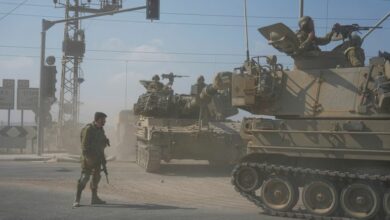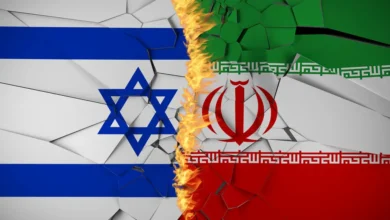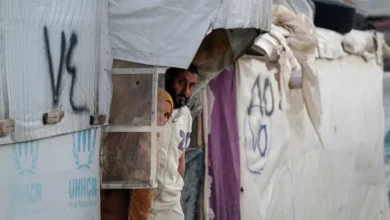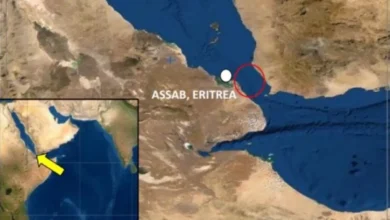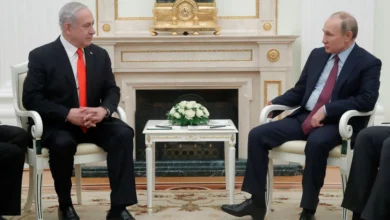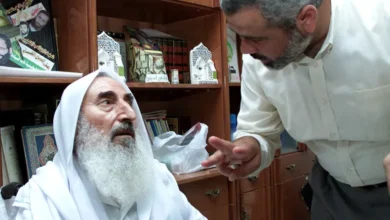Punched, choked, kicked: German police crack down on student protests
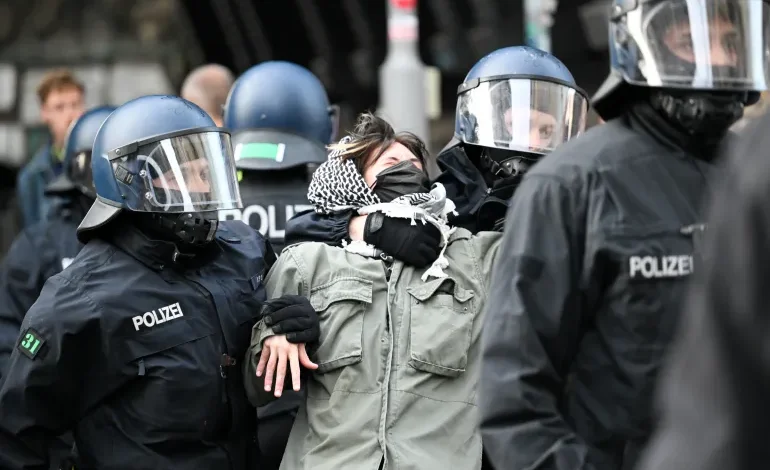
“We are witnessing a great endangerment of academic freedom – and this has started since the beginning of Israel’s war on Gaza,” says Cecilia, an undergraduate student at Berlin’s Free University.
After her university published what she saw as a one-sided statement of support for Israel following the Hamas attacks of October 7, and students on campus began to experience an increase in Islamophobic harassment on campus, she and others formed a committee to show solidarity with Palestine and oppose Israel’s war in Gaza.
At universities across Germany, thousands of students like her have mobilised in support of Palestine, leading demonstrations, organising lectures and sit-ins occupying university buildings and campus lawns. They have also opposed the speeches of visiting Israeli officials – notably Israeli ambassador Ron Prosor who visited Cologne University in January and the Israeli judge, Daphne Barak-Erez who spoke at Humboldt University in February.
But students and university staff also say that their right to free expression has come under assault from hostile media coverage, repressive legal measures taken by universities and politicians, and the use of police violence against peaceful demonstrators.
“Staff, teachers and students who have been trying to objectively teach and raise their voice about what is happening in Gaza and Palestine have been systematically repressed,” says Cecilia.
Occupations and encampments
Campus activism in Germany has stepped up in recent weeks as students, following their American counterparts, have established occupations or encampments on university grounds in Berlin, Munich, Cologne and other cities. Organisers are calling for German universities, most of which are public, to support a ceasefire in Gaza, an academic and cultural boycott of Israel, an end to the repression of student activism, as well as further acknowledgement of Germany’s colonial history.
While some protests have proceeded peacefully, others have been dispersed by police, sparking public debate about whether students have exceeded the limits of protected speech and protest in Germany, or whether authorities have infringed on those same rights in order to suppress antiwar activism.
On Wednesday, students occupied the department of social sciences at Berlin’s Humboldt University. They unfurled a banner designating the building the “Jabalia Institute”, the name of a refugee camp in Gaza, and renamed its library after Refaat Alareer, a Palestinian poet killed by an Israeli air strike in December.
Inside, students barricaded the main entrance and spray-painted the walls with slogans including “Killing civilians is not self-defence” and “Resistance is legitimate”.
The university’s administration permitted the occupiers to stay until the following evening and engaged in negotiations with organisers in the building. But on Thursday, the university’s president, Julia von Blumenthal, told journalists that Berlin’s Social Democratic (SPD) senator for science, Ina Czyborra, and Christian Democratic Union (CDU) mayor Kai Wegner, had demanded that she end the discussions and order a police eviction.
Officers then evicted more than 150 people from the grounds and charged 25 with suspicion of committing criminal acts. One student occupier told Al Jazeera that police punched her head repeatedly and kicked her, sending her to hospital with a concussion. Ignacio Rosaslanda, a video journalist for the Berliner Zeitung who was covering the operation was beaten by an officer despite identifying himself, and said he was denied access to medical treatment for several hours.
“Our universities are places of knowledge and critical discourse – and not lawless spaces for antisemites and terror sympathisers,” tweeted Wegner, shortly before the eviction began.
The occupation followed the eviction of an encampment at Berlin’s Free University on May 7, which was broken up by police after just a few hours without any attempt at dialogue, protesters say. Al Jazeera witnessed officers punching, choking and kicking peaceful protesters without provocation, while they made 79 arrests.
After more than 300 lecturers from Berlin universities signed an open letter that accused the Free University of violating its duty towards dialogue and non-violent engagement with students, the signatories were publicly condemned by federal Minister of Education and Research Bettina Stark-Watzinger of the Free Democratic Party, who called their statement “shocking” and accused them of “trivialising violence”.
Three days later, the right-wing tabloid, Bild, published the names and faces of several signatories under a headline that described them as “Tater”, the German word for “perpetrator”, which often carries an implied comparison with the Nazis.
At a government news conference convened on Tuesday to discuss the issue of student protests, Michael Wildt, a renowned Holocaust scholar whose face appeared as one of the signatories to the open letter in Bild’s story, called for a de-escalation of tensions. “Anyone who is now primarily demanding repressive measures is paving the way for an authoritarian understanding of the state,” he said.
Clemens Arzt, a professor at the Berlin School of Economics and Law, warned at the same event against restricting the right to freedom of assembly, and said that he could see no legal justification for the eviction of the Free University encampment.

